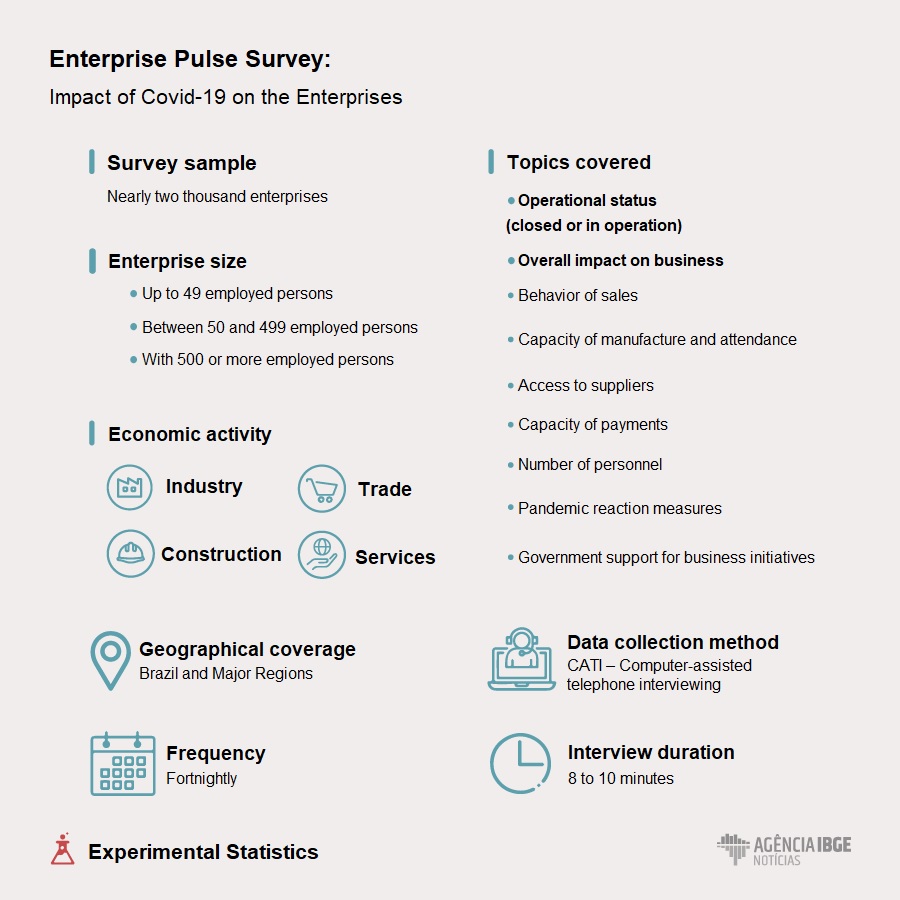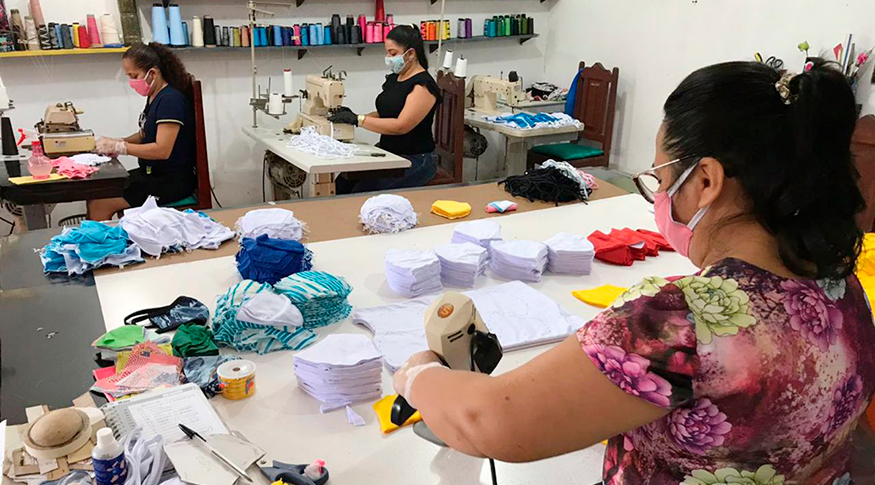Pesquisa Pulso Empresa
New survey follows up impact of Covid-19 pandemic on enterprises
July 09, 2020 09h00 AM | Last Updated: July 10, 2020 05h30 PM
The IBGE will release on Thursday (16) the first results of the Enterprise Pulse Survey: Impact of Covid-19 on the Enterprises, which will follow up the effects of the novel coronavirus pandemic in the industrial, construction, trade and services sectors. The data collection began on June 15 with nearly two thousand enterprises through telephone. The survey is part of the whole set of the IBGE´s Experimental Statistics.
The results will be released on a fortnightly basis and they will be available on the covid19.ibge.gov.br hotsite, with information for Brazil and Major Regions. The first release will bring comparisons between the first fortnight of June and the period before the beginning of the pandemic, on March 11. The others will bring comparisons with the immediately previous fortnight.
The survey will show data on the level of impact of the pandemic on the behavior of sales and on the conditions of manufacture or attendance of the enterprises in relation to their clients. It will also bring indicators on the access of the enterprises to their suppliers and the capacity to carry out routine payments. The survey will show the perception of the enterprises on changes in the personnel and the major reactions adopted by them. It will also reveal the positioning of the enterprises in face of the emergency measures of the government, like the postponement of tax payments and the use of an emergency credit line for the payroll.
The results will be released as aggregates for the industrial and construction sectors. On the other hand, trade data will be released by wholesale, retail and trade of vehicles, parts and motorcycles. The services sector will also have information disaggregated by services rendered to families; information and communication services; professional, administrative and complementary services; transportation services, support services to transportation and mailing; and other services.
"These data will allow us to estimate, for example, the percentage of enterprises that interrupted their activities, even temporarily. The proportion of enterprises that considered difficult or easy to assist their clients, to access their suppliers, to carry out routine payments, as well as the major reaction measures, like launching new products or services and changing the way of delivery to online. Whether they postponed tax payments and whether they obtained an emergency credit line for the payroll. How many adopted home office, anticipated holidays and carried out prevention campaigns adopting extra hygiene measures", details Flávio Magheli, coordinator of the survey.

To assemble the survey sample, organizations of the IBGE´s Central Register of Enterprises - Cempre were selected in all the Brazilian states, according to the size by employed personnel, and divided into three ranges: companies with up to 49 employed persons; between 50 and 499 employed persons; and with 500 or more employed persons. According to the project leader, Alessandro Pinheiro, it produced a very representative sample, with a high percentage of small enterprises.
"The survey will provide an overview of the smaller enterprises, which are the major employers in Brazil and also the most affected by the pandemic, since they do not have the same structure of the larger ones and the same conditions to access credit", commented Pinheiro.
Representatives from nearly two thousand enterprises were interviewed by 100 data collection agents from the IBGE during the first cycle of interviews, which ended on June 30. The complete sample of the survey comprises nearly 11 thousand enterprises.
"It is a relatively short survey, which takes around 8 to 10 minutes, with simple questions, whose concepts are easy to understand and answer. It streamlined the training and work of the interviewers. The enterprises were very responsive," said Andrea Salvador, manager of the IBGE´s Computer Assisted Telephone Interview Center - Cetac.

Inspired by other international experiences, the Enterprise Pulse Survey was completely developed by the IBGE´s Directorate of Surveys. For Eduardo Rios-Neto, director of Surveys, this survey complements the scenario firstly portrayed by PNAD COVID19, a survey that has been tracking the effects of the pandemic on the labor market and people´s health. The IBGE began to release the results of PNAD COVID19 back in June.
"There were questions related to the new reality imposed by the novel coronavirus that the other IBGE surveys could not answer in the short term. PNAD COVID19 was then developed to analyze the situation under the household point of view, and now the Enterprise Pulse Survey do it under the economic point of view. This has been made by the IBGE in a short time, with technical competence and the teams under social distancing", said the director.
The enterprises that receive the call can confirm the identity of the interviewer through the telephone 0800 721-8181 or through the Answering the IBGE web page. Those enterprises that request it can receive a formal notice about the survey through email. The confidentiality of the information collected by the IBGE is assured by Law no. 5,534/1968, which deals with information secrecy and assures that the data can only be used for statistical purposes.
Read below some statements from IBGE coordinators on the survey:
Unlike the Continuous PNAD and other IBGE´s short-term surveys, the Enterprise Pulse Survey is a tool prepared to provide quick answers. We will have information related to the enterprises quickly, like PNAD COVID19, which provides data on unemployment, underutilized population and emergency aid. They are complementary surveys that measure social and economic time trends in enterprises and households.
Cimar Azeredo, IBGE´s deputy director of Surveys
_________
The survey is key to understand the impact of the pandemic on the enterprises in the short term. Firstly because it is fortnightly, quicker than the IBGE´s monthly surveys. It makes other questions, different from those that we make in other surveys that target a specific figure, like, for example, how much did the industrial output drop or rise in a given period. The survey searches for the feeling of the enterprises in relation to the impacts of the pandemic. It will show that, both under the point of view of the production chain and of the supply and demand.
Rebeca Palis, IBGE´s coordinator of National Accounts
_________
With the Enterprise Pulse Survey, the IBGE conforms to the actions of other official producers of statistics in relation to the impacts of the Covid-19 pandemic on the society. Based on international experiences and under an experimental character, this survey is an important tool to understand and follow up the effects of social distancing due to the pandemic on the business environment.
Andréa Borges Paim, IBGE´s coordinator of Methods and Quality
_________
As it pinpoints the most undermined sectors and the major bottlenecks of the enterprises, in a scenario in which the level of economic activity was severely affected by the pandemic, the survey will provide important information for public policies, injection of public resources and support to workforce. This survey will measure the degree of resiliency of the enterprises from several sectors, and their expectations in relation to the business environment. By measuring those expectations, it is possible to map a scenario for the economic recovery in the medium and long term.
Gustavo Vitti, IBGE´s coordinator of Price Indexes




















